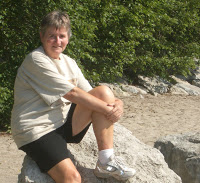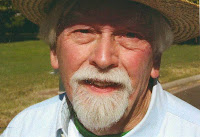men have influenced my life; most positively, some not.
I went off to college, the only males I had formed any attachment for were my
father and maternal grandfather and a teacher. The boys in school all seemed
too immature for words and essentially I ignored them, preferring the company
of girls; especially one, with whom I remained secretly in love through all my
schooldays, but I won’t digress as this is supposed to be about men.
dad I have written about many times, I will simply say that I loved him, he
loved me, and in a strangely silent way we became increasingly close over his
lifetime. And, yes, even since his death. My mother’s dad died when I was
pretty young so I don’t remember very much about him, except that I was always
happy just to sit with him while the carved beautifully ornate headstones out
of the local marble. Only slightly more garrulous than my father, he sometimes
sat in silence for what seemed like hours, but I was a little kid so maybe it
wasn’t really so long. I do know I never got restless or tried to make him
chat. I loved just being there, watching his clever hands create such intricate
beauty. Occasionally he shocked me with a sudden swift launch into
story-telling – spellbinding and supposedly true although looking back, even if
I cannot recall the details of any, I doubt their veracity. But despite these
rare jaunts off into the world of monologue, words were few. So the first two
men in my life, both of whom I loved greatly, folded me into a strong, silent
world; a world where deeds spoke much louder than words. A world of true, if
silent, love. They actually had a lot in common, Dad and Granddad, although not
related by blood. (Not so very surprising, I guess, as girls supposedly tend to
marry a man like their father.) They are also connected, in my child’s memory,
by birds; more specifically, robins. The English robin, quite unlike the
American version, is a small brown bird with a scarlet breast, known for it’s
inquisitive nature. One it seemed was always around, watching my grandfather
chisel and hammer just as I did. The little bird’s head bobbed from one side to
the other as he seemed to evaluate Granddad’s every move with his sharp, shiny,
little black eyes. My father had his faithful robin, too, who followed him
around on his chores; waiting, I’m sure, for tasty morsel to be offered up in
the process.
other strong male influence in my youth was my high school geology teacher. He
was one of the natural teachers of this world, and carried with him an aura of
boundless energy and enthusiasm which was very contagious. At weekends he and
his little band of devoted followers would slog up and down wet Welsh
mountains, returning home exhausted with pockets and bags groaning under the
weight of rocks and minerals and fossils. He blessed my life with a fascination
with geology which has remained with me throughout. And, no, I didn’t have that
schoolgirl crush on him which tends to accompany teenage admiration, and which
I’m sure some of the girls succumbed to. I was immune. My passions were spent,
as are all good lesbian youthful crushes, on my female gym teacher!
college I was never romantically involved with any men, being passionately but
secretly, even for the most part hidden from myself, devoted to a female
classmate. But I learned a lot from men in my life who were completely unlike
any of the boys I knew at school. Inevitably so; they came from different
worlds. My professor at The University of Sheffield had been a prisoner of the
Japanese in World War Two. They had cut out his tongue. Consequently, his
lectures were very difficult to follow until you became tuned in. I was
incredibly impressed by his courage and tenacity in returning after the war to
a position made difficult and, I would suppose, embarrassing, by his
affliction. I also learned forgiveness from this man. I never once heard him
say anything negative, either in class or in private gatherings, about the
Japanese or their country. The attitude he maintained made it very clear that
he held no grudges; no animosity. This was 1959, so he had had fifteen years to
get there, and how long it took or what efforts it cost him, I don’t know. But
ever since, upon finding myself harboring resentment over some petty words or
deeds, I have tried to remind myself of a wonderful man who managed to forgive
completely a truly terrible wound.
at Sheffield University in the late 1950’s and early ’60’s were several young
men who had managed to escape Hungary after the invasion by the U.S.S.R in
1956. I had seen, on the tiny old black-and-white T.V., the street fighting in
Budapest where these men, or others just like them, faced up to tanks with
nothing but a handful of rocks. We found them strange, these dark brooding
silent men who emitted such an unmistakable air of rage. They never bragged, or
even mentioned, anything they had done in defense of their homeland. If they talked at all it was of nothing but
their hatred of the Soviets and their endless innumerable plans to free Hungary
and return home. They hated England, and refused to offer any sliver of
gratitude for the free college education they were taking advantage of at that
very moment. We didn’t like them. They were unfriendly. They were no fun. They
were freeloaders. Then I slowly formed a friendship with one of them, and was
forced to dig deeper and learn. Domonkos needed a lot of help
understanding our mutilated professor’s lectures, and I somehow fell into
spending time going over every class with him. Usually this was in a coffee
shop or pub, and slowly his entire story came out. He himself had not been one
of those tossing stones at tanks. He had tried to protect his mother and
sisters but instead was made to watch while they were raped and then shot. His
father had died in Auschwitz in 1945. His mother and sisters and he, had for
some reason been taken to Mauthausen, from which they were liberated at the end
of the war; only for the women to die at the hands of the Soviets in 1956. Was
all this true? I had no way of knowing, but I had no reason to doubt it. It
didn’t seem to matter. This young man had clearly suffered from terrible
traumas, no matter the details.
told me similar stories of his fellow Hungarians students, until I was numb to
the horror of his tales. Numb in a sense, yes, but he also forced me to wake
up. I and my friends found these men boring? They were no fun?
How much fun would we be, under such circumstances? In all honesty, I could not
warm to them as a group, nor even to Domonkos himself. But through them I
learned to look below the surface; to see perhaps why people act as they do. To
care for them, to empathize, despite no real affection or liking. To try to be
quicker to understand and slower to judge.
came adulthood and, at the age of 26, marriage. My husband was not a silent man
like my father, nor was he terribly loud and verbose. He did not have my
teacher’s energy and passion, but he worked and played hard enough. He
certainly was not Hungarian-style hating and morose. He was really a pretty
average guy doing his best, but with my homosexuality lurking around, rising ever
closer to the surface, the marriage was doomed from the beginning. It was the
final chapter of my book of learning that if you are not true to yourself you
simply cannot bring happiness to others. My poor husband inadvertently taught
me that.
long after we married, his four children unexpectedly came to live with us.
Once over the shock, I coped pretty well, and step-motherhood became a positive
experience for me and for the children, three of whom were boys. Over the
years, they became new men in my life. I know parents cannot have favorites,
but I say that’s one of the advantages of the step- relationship.
truly think I didn’t show it, but my oldest step-son was my favorite. I loved
all four kids, and they loved me, but I adored Dale. As did many many people.
He could charm anyone; girls, boys, men, women, neighbors and friends, teachers
and police. What defenses could a helpless step-mother employ? Sadly, this very
charm turned on him and did him evil rather than good. He was born to trouble,
it seemed, and he almost invariably charmed his way out of its consequences,
and so led him deeper down the wrong path. The real trouble, which no-one can
talk themselves a way out of, was serious unrepenting un-recovering alcoholism.
This became manifest in his early teens and lasted all his life, which
predictably was short. He died a few years ago at the age of fifty. I was
heartbroken, although he had not been in touch with any of his family for a
long time so the hole he had dug in my heart was nothing new. It had been there
for many years.
my divorce, I still worked mainly with men so I did not register an absence of
men in my life even after my social life morphed to consist mainly of lesbians
and straight female friends. Post-divorce, I tried to keep up some male
friendships but straight men all know that a divorcee is looking for only one
thing. It was hopeless. After I was out to the world, I foolishly imagined this
might change, but straight men all know what it takes to cure a lesbian. It was
hopeless.
Betsy and I moved in together we found both of us equally missed the rumble of
men’s voices in the house; in our lives. We both like men. We looked around.
The answer stared us in the face; gay men. They had no interest in
whatever divorcees were after or what it took to cure lesbians. But hold your
horses! Not so easily done. Looked at objectively, where is the attraction? Gay
men and women are the ones not drawn to each other. So – you need a
catalyst; something to attract both, other than each other. Betsy joined a gay
tennis group where we did make a few male friends, but as she was the only
woman who ever belonged, it slowly fizzled out.
Center was, of course, our salvation, and especially this group. We now are
grateful to have many men in our lives with whom to share laughter and tears,
anger and celebration, memorials and hospital visits and parties.
love the men in my life.
always have.
graduation from college there, I moved to the U.S. and, having discovered
Colorado, never left. I have lived in the Denver-Boulder area since 1965,
working for 30-years at IBM. I married, raised four stepchildren, then got
divorced after finally, in my forties, accepting myself as a lesbian. I
have been with my wonderful partner Betsy for thirty-years. We have been
married since 2013.



